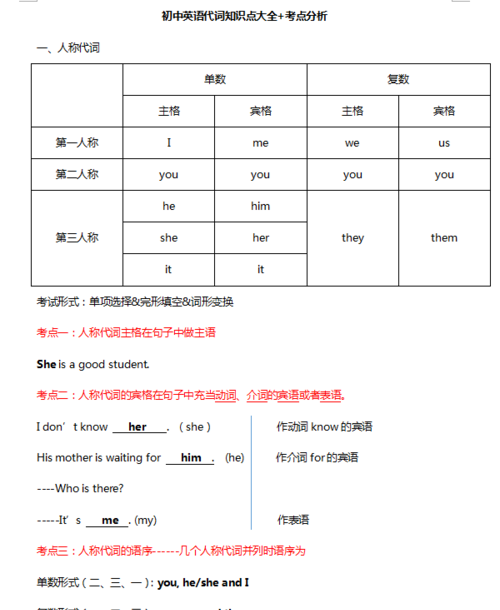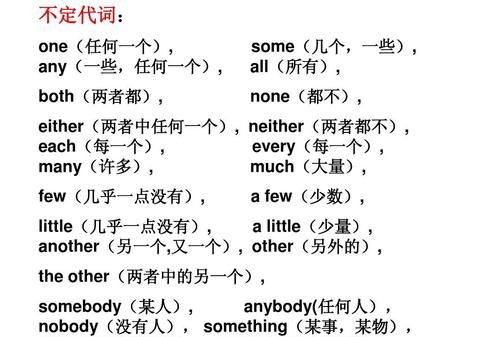本文目录
关于不定代词的语法知识点
英语不定代词的重点语法
导语:不定代词大都可以代替名词和形容词,在句中作主语、宾语、表语和定语。下面我讲解不定代词的相关语法,欢迎参考!

一、不定代词概说
英语的不定代词有 all, each, both, either, neither, one, none, little, few, many, much, other, another, some, any, no, (a) few, (a) little, both, enough, every 等,以及由 some, any, no 和 every 构成的合成代词(即somebody, anyone, nothing 等)。在这些不定代词中,多数都能作主语、宾语、表语或定语,但是代词 none 以及由 some, any, no 和 every 构成的合成代词只能作主语、宾语或表语,不能作定语,而 no 和 every 则只用作定语。
二、指两者和三者的不定代词
有些不定代词用于指两者(如both, either, neither),有的不定代词用于指三者(如all, any, none, every),注意不要弄混:
Both of my parents are doctors. 我的父母都是医生。
All of the students are interested in it. 所有的学生对此都很感兴趣。
There are trees on any side of the square. 广场的每一边都种有树。
He has two sons, neither of whom is rich. 他有两个儿子,都不富有。
He has three sons, none of whom is rich. 他有三个儿子,都不富有。
【说明】each 可用于两者、三者或三者以上,而 every 只用于三者或三者以上,因此用于两者时只能用 each,不能用 every。如不能说 There are trees on every side of the road.
三、复合不定代词的用法特点
复合不定代词包括 something, somebody, someone, anything, anybody, anyone, nothing, nobody, no one, everything, everybody, everyone 等。它们在句中可用作主语、宾语或表语,但不能用作定语。something, someone 等和 anything, anyone等的区别与 some 和 any 的区别一样,前者一般用于肯定句,后者一般用于否定句、疑问句或条件句(参见 any & some)。具体使用时应注意以下几点:
1. 复合不定代词受定语修饰时,定语应放在它们后面:
There is nothing wrong with the radio. 这收音机没有毛病。
Have you seen anyone [anybody] famous? 你见过名人吗?
2. 指人的复合不定代词若用作主语,其谓语动词一般用单数,相应的人称代词和物主代词也用单数 he, him, his (不一定指男性)。但在非正式文体中常用复数代词 they, them, their:
Everyone knows this, doesn’t he [don’t they]? 人人都知道这一点,不是吗?
If anybody [anyone] comes, ask him [them] to wait. 要是有人来,让他等着。
3. 指事物的复合不定代词若用作主语,谓语动词只能用单数,相应的人称代词也只能用 it,而不用 they:
Everything is ready, isn’t it? 一切都准备好了,是吗?
4. anyone, everyone 等只能指人,不能指物,且其后一般不接of 短语。若是指物或后接 of 短语,可用 any one, every one (分开写):
any one of the boys (books) 孩子们(书)当中的任何一个(本)
every one of the students (schools) 每一个学生(一所学校)
四、是any not 还是 not any
按英语习惯,any 以及含有any的复合不定代词用于否定句时,它只能出现在否定词之后,而不能在否定词之前:
误:Any one doesn’t know how to do it.
正:No one knows how to do it. 任何人都不知道如何做它。
误:Anybody [Anyone] cannot do it.
正:Nobody [No one] can do it. 这事谁也干不了。
误:Anything cannot prevent me from going.
正:Nothing can prevent me from going. 什么也不能阻挡我去。
五、不定代词与部分否定
不定代词all, both, every 等与 not 连用时构成部分否定;若要表示完全否定,则需换用 none, neither, no one等。比较:
All of the students like the novel. 所有这些学生都喜欢这本小说。
Not all of the students like the novel. 并不是所有这些学生都喜欢这本小说。
All of the students don’t like the novel. 并不是所有这些学生都喜欢这本小说。
None of the students like the novel. 这些学生当中没有一个喜欢这本小说。
六、all, both, each 等用作同位语
若用作主语同位语,主语可以是名词或代词;若用作宾语等其他成分的同位语,则宾语等成分必须是人称代词,而不能是名词:
We have all read it. 我们都读过他。(all 修饰的主语是代词)
The villages have all been destroyed. 村庄都被毁了。(all 修饰的`主语是名词)
They told us all to wait there. 他叫我们都在那儿等。(all 修饰的宾语是代词)
但不能说:They told the men all to wait there. (all 修饰的宾语是名词不是代词)
七、so little 与 such little的区别
用so little还是such little取决于little的意思:若表示数量方面的“少”,则用so little;若表示形状体积的“小”,则用such little:
He has so little time for reading. 他读书的时间少得可怜。
I’ve never seen such little boxes. 我从未见过那样小的盒子。
八、some 与 any的用法区别
一般说来,some 用于肯定句中,any 用于否定句和疑问句中。但是,在表示请求、邀请或征求意见的句子中,通常要用 some 而不用any:
Would you like some cake? 吃点蛋糕吗?
Why not buy some bread? 为什么不买些面包呢?
Shall I get some chalk for you? 要我帮你拿些粉笔来吗?
【说明】any 有时也用于肯定句中,此时表示“任何”:
Any colour will do. 任何颜色都行。
Come any day you like. 随便哪天来都可以。
九、many 与 much的用法区别
两者都表示“许多”,但 many 修饰或代替可数名词(复数),与 few(少数)相对;而 much 用来修饰或代替不可数名词(单数),与little(少量)相对。在口语中两者主要用于非肯定句中:
Did you see many people there? 你在那儿看见许多人了吗?
We don’t have much time. 我们没有许多时间。
在肯定句中,一般用 a lot of, lots of, plenty of 等代之。但在正式文体中有时也用于肯定句中;另外,若用作主语或主语的定语,或其前有 how, too, as, so, a good, a great 等修饰,也可用于肯定句中:
Many of us left early. 我们有许多人离开得很早。
Much work has been done. 许多工作都已经做了。
You’ve given me too much. 你已给我太多了。
Take as many (much) as you want. 你要多少拿多少。
I asked her a great many questions. 我问了她许多问题。
十、few, a few 与 little, a little的用法区别
1. few和a few 后接可数名词的复数形式。few 表示数量很少或几乎没有,强调“少”,含有否定意义;a few 表示数量虽然少但毕竟还有,强调“有”,含有肯定意义:
It is very difficult, and few people understand it. 它很难,没有几个人能懂。
It is very difficult, but a few people understand it. 他虽难,但是有些人懂。
2. little 和 a little 之后接不可数名词,其区别跟 few 和 a few 之间的区别相似:
Unfortunately, I had little money on me. 很不巧,我身上没带什么钱。
Fortunately, I had a little money on me. 幸好我身上带着一点钱。
;复合不定代词作主语时谓语动词用什么数
复合不定代词表示单数概念,作主语时谓语动词用单数形式。例:Nothing is difficult in the world if you put your heart into it.
例句
Everyone is here. 大家都在这儿。(大家都到齐了。)
Something is wrong with my watch.我的手表出问题了。
Someone has been here before.以前有人到过这里。
复合不定代词用法大盘点
复合不定代词是由some-,any-,no-,every-加上-one,-body,-thing等所组成的不定代词。复合不定代词包括something, somebody, someone, anything, anybody, anyone, nothing, nobody, no one, everything, everybody, everyone等十二个。这些复合代词具有名词性质,在句中可用作主语、宾语或表语,但不能用作定语。使用时注意以下几点:
一、复合不定代词的指代对象
1、含-body和-one的复合代词只用来指人,含-body的复合不定代词与含-one的复合不定代词在功能和意义上完全相同,可以互换。只是用-body时显得较通俗些,多用于口语中,用-one时显得较文雅些,更常见于正式场合及书面语中。如:
Someone/Somebody is crying in the next room.有人在隔壁房间哭。
No one/Nobody is stupid.没有谁是愚蠢的。
2、含-thing的复合不定代词只用来指事物。如:
Are you going to buy anything?你会去买东西吗?
I can hear nothing but your voice.我只听到了你的声音。
二、复合不定代词的属格
1、含-one和-body等指人的复合代词可有-'s属格形式。如:
Everybody's business is nobody's business.大家的事情没人管。
Is this anybody's seat? 这儿有人坐吗?
2、含-one和-body等指人的复合代词后跟else时,-'s属格应加在else之后。如:
Can you remember someone else's name? 你还记得其他人的姓名吗?
3、含-thing等指事物的复合不定代词没有-'s属格形式。
三、复合不定代词的数
1、复合不定代词都具有单数的含义,因此通常被看成是单数第三人称。当它们充当句子的主语时,其后的谓语动词用单数形式。如:
Is everyone here today?今天,大家都到齐了吗?
Nothing is difficult if you put your heart into it.世上无难事,只怕有心人。
2、当要对一群人讲话时,可使用以复合不定代词作主语的祈使句,句中的动词用原形。如:
Nobody move!都别动!
Everyone lie down!统统趴下!
四、复合不定代词的替代问题
由于复合不定代词都具有单数的含义,所以在正规的英语中用来替代它们的代词也应该是单数形式。
1、含-one和-body等指人的复合代词,其代词应该是he/she, him/her,其-'s属格形式的代词应该是his/her, his/hers。如:
Everyone has his/her own words.每个人都有他(她)自己的说辞。
但是,这样一来就会因为性别的差异而使得在代词的运用上具有不确定性,所以为了避免这种别扭的情况,我们一般都是用they/them/their/theirs,尤其是在口语中以及非正式场合下。如:
No one gave you a ticket, did they? 没人给你票,是吗?
Someone came in, but I didn't know who they were. 有人进来了,但我不知道是谁。
2、含-thing等指事物的复合不定代词,不会因性别上的差异而使得在代词的运用上产生不确定性,因此我们就使用it。如:
Something goes wrong, doesn't it?出问题了,是吗?
五、复合不定代词的定语
复合不定代词的定语必须后置,即放在复合不定代词的后面。如:
Can you tell something interesting?你能讲些有趣的事情吗?
Is there anybody important here?这儿有大人物吗?
Would you like something to eat?要来些吃的东西吗?
六、含some-和any-的复合不定代词间的用法区别
由some-和any-所构成的复合不定代词(即something和anything;someone和anyone;somebody和anybody)之间的区别跟some和any的区别一样。
1、something,someone,somebody通常用于肯定句中,而anything,anyone,anybody一般用于否定句,疑问句或条件状语从句中。如:
He found something strange but interesting.他发现了一些奇怪但却有趣的事情。
Do you have anything to say?你有话要说吗?
I can't meet anybody on the island. 在岛上,我没遇见任何人。
2、在表示请求、邀请、提建议等带有委婉语气的疑问句,和希望得到对方肯定答复的疑问句,以及表示反问的问句中,也用something,someone,somebody等复合不定代词。如:
Would you like something to eat?要些吃的东西吗?
Isn't there something wrong with you?难道你没问题吗?
3、当anything表示“任何事(物),无论何事(物)”,anyone,anybody表示“无论谁,任何人”等意义时,它们也可以用于肯定句中。如:
Anything is OK. 什么都行。
Anybody knows the answer.任何人都知道答案。
七、复合不定代词的否定
1、“not every-”表示的是部分否定,意为“并非都,不都”。例如:
Not everything will go well.并非一切都会那么顺利。
The teacher didn't call everyone's name.老师并没有点所有人的名。
2、“not any-”和no-均表示全否定。例如:
He listened, but heard nothing.他听了听,但什么也没听到。
= He listened, but didn't hear anything.
You haven't called anyone/anybody up, have you?你没给谁打过电话,是吗?
= You have called no one/nobody up, have you?
八、复合不定代词作名词
复合不定代词可以充当名词用,表示“……的事情(东西或人)”。
1、someone/somebody, anyone/anybody的意义是“重要人物,大人物”,everyone/everybody意为“最重要的人”,no one/nobody则意指“无关紧要的人,小人物”。例如:
2、something,anything的意义是“重要事情(东西)”,everything表示“最重要的事情(东西)”,nothing则指“毫无趣味的事情,无关紧要的东西”。
九、合与分的区别问题
1、 someone,anyone,everyone都只能指人,且不和介词of连用;some one,any one,every one则既可指人又可指物,可与介词of连用。例如:
Anyone should be polite to every one of them.任何人都要礼貌对待他们中的每一个人。
---Which toy would you like? ---Any one is OK. ---你要那个玩具?---随便。
2、no one(=nobody)“没有人”,只用来指人,通常不和介词of连用;none“没有一个”,既可以用来指人也可用来指物。例如:
No one can do it better. 没有人能做得更好。
None of these questions is easy, and none of us can even answer any one of them.这些问题没有一个是容易的,我们中没有一个人能答出其中的一题。
回答who引导的特殊疑问句时用no one;回答how many引导的特殊疑问句时用none。例如:
---Who was late ? ---No one. ---谁迟到了?---谁也没有迟到。
---How many pigs do you keep? ---None. ---你养几头猪?---一头也没养。

初中复合不定代词用法总结
初中英语语法大全之复合不定代词总结
复合不定代词

somebody ,something ,anything, nothing ,everything, everybody等是由some , any ,no ,every, 加上body, thing 构成的,叫做复合不定代词,在句子中当单数使用。
somebody, something, someone 一般用于肯定句中;anything, anybody,anyone一般用于疑问句、否定句和条件状语从句中。修饰复合不定代词的定语,应放在它们的后面。
如:Hey,Lily. There is someone outside the door.(嗨,丽丽,门外有人。)
Di(每个人)d you meet anyone when you came to school last Sunday?(上个星期天你来学校时见到什么人了吗?)
He has nothing much to do today.(他今天没有多少事情做)
对于上面复合不定代词语法知识,相信同学们已经很好的掌握了,希望同学们在考试中取得优异成绩。
一步接一步 学好初中英语就这么简单
1.What is language for? Some people seem to think it is for practicing grammar rules and learning lists of words--the longer the words the better. That’s wrong. Language is for the exchange of ideas, for communication.
语言到底是用来干什么的呢?一些人认为它是用来操练语法规则和学习一大堆单词——而且单词越长越好。这个想法是错误的。语言是用来交换思想,进行交流沟通的!
2. The way to learn a language is to practice speaking it as often as possible.
学习一门语言的方法就是要尽量多地练习说。
3. A great man once said it is necessary 初一 to dill as much as possible, and the more you apply it in real situations, the more natural it will become.
一位伟人曾说,反复操练是非常必要的,你越多的将所学到的东西运用到实际生活中,他们就变的越自然。
4.Listening and imitating should always go together. Use the LIP method! Listen-Imitate-Practice!
听和模仿一定要同时做,使用“LIP”方法:听、模仿、操练!
初一英语作文:flower survived
Mrs Wang decided to make a trip to Beijing.When she told her son about her decision,he was so overjoyed that he jumped up.They began to pack their luggage.When the day came,the son became worried,for noboday would take care of his flowers.They would die if they were not watered.Suddenly a good idea came to his mind. "Mum",he said to his mother, "we can use a piece of cloth to take care of the flowers". He showed her mother what he meant by putting one end of the cloth into the basin, full of water,and the other end into the flower pot.
Three days later,when they came back from Beijing, the flowers were still alive and even started to bloom.
Mrs Wang decided to make a trip to Beijing.When she told her son about her decision,he was so overjoyed that he jumped up.
初一英语上册单词表之age
【—初一英语上册之age】下面是对英语单词age的内容知识讲解,相信可以很好的`帮助同学们对英语知识的掌握。
age n.
年龄;时期;变老 ;
短语:1. for one’s age 论年龄
e.g. He looks older for his age because of years of hard work.
由于多年操劳,他看起来比实际年龄大。
2. at the age of 在…岁时
上面对英语单词age的知识讲解学习,相信同学们已经能很好的掌握了吧,希望同学们考试成功。
初中英语词汇 单词拼写大全
一、单词拼写
1、Let’s have an e of views on the matter.
2、English is my second language, while Chinese is my mother t_______.
3、The dog h_______ when it was shut in the house.
4、When we are on holiday in America, we live like the n .
5、A t is a very violent tropical storm.
6、---- Where is Mother? ----She is in the b__________ to have a shower.
7、Can you tell me how to p___________ the word c-l-e-r-k?
8、Can you tell me how much the two _________(毛巾) are?
9、I asked my child to t away his toys when he had finished playing.
10、It is imprtant for a businessman to have a good k of English.
11、Chinese is our mother t_________.
12、He tried hard to read their face but there wasn’t any ____________(表情) on their faces.
13、She is briliant but her work lacks o , which has already been found by her boss.
14、English is also the (全球的)culture such as popular music and the Internet.
15、The _________ (大多数)of the students did it right.
16、Sorry, I can’t catch you. Can you r__________ what you said?
17、It was a boring speech because he r himself a lot.
18、The wind h throught the woods.
19、He has a ______ (广博的) knowledge of animals.
20、WTO stands for World T______ O____________.
21、A c is a piece of furniture with doors at the front and a shelves inside, which is used for storing things.
22、Mnay young people in China can’t be i of their parents even when they are over 20 years old.
23、Greece is a_______(欧洲) country with a very long history.
24、Now women and man are (平等)under the law.
25、It’s said that Australia became i_______ of Britain on the 1st of January , 1901.
26、If you’re a basketball player, you must know that loose clothing gives your greater freedom of m .
27、Can you imagine that how long it will take if you take a nonstop ________(环球) flight?
28、The differences are greater in the spoken English than those in w English.
29、hey were trapped in the mountain. The only way to (交流)with each other was to use the mobile phone.
30、The m___________ of children in our class have short hair; only three have long hair.
31、At least 30 unknown diseases have appeared ___________ (在全世界范围内)since 1970.
32、P_________ Bush will visit Japan next month.
33、The main street of the city is b .
34、For exercise nothing c with swimming.
35、You can use English to c________ with people from different places through the Internet.
36、Generally speaking, teachers are able to c___________(传达) their ideas clearly.
37、Another 17 airlines are now operating from the airport, increasing the t to 87.
38、The shirt I bought yesterday doesn’t fit me well. Can you r_________ it for another one or give me money back?
39、The plane ______ (飞) from Paris to Rome last night.
40、We must pay attention to the ____________(国际的) _________(形势) because it is complicated(复杂的) and changeable.
41、My garden c with the one next door by means of a gate, which has made it possible for a rat to go everywhere.
42、He gave me an apple in ___________(交换) for a cake.
43、As is know to all, the country’s economy is dependent on t .
44、If you don’t know how to make food delicious, you can refer to a c___________.
45、Th company is i with offices in more than 50 countries.
46、It is e to me whether he comes or not.
47、Our ____________(政府) encourages people to plant more trees to make the world around us more beautiful.
48、Can you think of a s_________ where “doing it alone” might be more important than teamwork.
49、China is an ____________(独立) country.
50、He s the car to stop by raising his hand.
51、Women and men have the e_________ rights.
52、The dicitionary will be p by the Oxford University Press.
53、The excited ________ (表情)on his face showed everything.
54、The (大多数)of children in our class have brown eyes; only three have blue eyes.
55、The (多数的)of people are for the plan.
56、Our t helps us to talk and to taste things.
57、Please _____ (重复) what you said. I didn’t hear clearly.
58、The _________________(指挥官) ordered his men to advance.
59、The s_________ in this shop is always slow; the girls are very lazy. I won’t stay here any more.
60、France is a E country.
61、Mr Wang,who is a Beijing (本地人),works hard.
62、If you don’t like your book, I’ll t with you.
63、----There are so many students in the class. What does the t______ come to?
---- Oh, it comes to 64 in all.
64、I bought a new hat to r the old one.
65、---- What is your mother t_________?
---- My n________ language is Chinese.
66、Since we are his real frinds, we should try our best to help him out of the difficult s .
67、Is Chinese one of the _________ () languages of the United Nations?
68、He (反复说)there was no quick answer to your question.
69、It is difficult to tell what our f_____ will be.
70、In what ________ (情形) do you use these words?
71、He dried his hands with a t .
72、A c is a book that contains recipes for preparing food.
73、America didn't become (独立)until 1776.
74、What is his __________ (本族) language?
75、Let’s leave ______ (立即) after breakfast.
76、There are more than 375 million native speakers of English. That is, for more than 375 million people English is their mother t .
77、He was elected p the next year and became the most powerful public character
78、One li is e to half a kilometer.
79、The railway ________(信号) showed that the train could pass.
80、At first we’ll learn new words and e and then go over the text.
81、He led us to another restaurant, the s which was the best in that area.
82、The Iraqi war told us all that it was not easy to make the dream of g peace come true in any part of the world.
83、An Englishman usually puts his coat in the c______ after he reaches home.
84、Italy, Germany and France are all E________ countries.
85、In 1776 American became an (独立的)country.
86、Generally speaking, teachers are able to c their ideas clearly.
87、The country became _______ (独立) in 1948.
88、A red light is a _________ (信号) of danger.
89、He loved her so much that he often c__________ her to a beautiful flower.
90、The teacher told us to t_______ the classroom so that it could seem more pleasant.
91、 (贸易)with other countries is important.
92、Do you have d______ pronouncing the word?
93、Joe and Nancy are not visitors here. They are both n_____ of the city .
94、The doctor p that the man was no longer in danger.
95、Would you please _______ (发音)the words clearly and pay attention to the _______ (发音) of each word you learn.
96、They had a large m over the other party at the last election.
97、Writing English is much more difficult to learn than _______ (口头) English.
上册unit 2单词拼写大全参考解答
一、单词拼写
1、exchange
2、tongue
3、howled
4、native
5、tornado
6、bathroom
7、pronounce
8、towel
9、take
10、knowledge
11、tongue
12、expression
13、organisation
14、global
15、majority
16、repeat
17、repeated
18、howled
19、broad
20、Trade, Organisation
21、closet
22、independent
23、European
24、equal
25、independent
26、movement
27、global
28、written
29、communicate
30、majority
31、global
32、President
33、broad/busy
34、compared
35、communciate
36、communicate
37、total
38、replace
39、flew
40、international, situation
41、communicates
42、exchange
43、tourism
44、cookbook
45、international
46、equal
47、government
48、stand
49、independent
50、signaled
51、equal
52、published
53、expression
54、majority
55、majority
56、tongue
57、repeat
58、commander
59、service
60、European
61、native
62、trade
63、total
64、replace
65、tongue, native
66、situation
67、working
68、repeated
69、future
70、sistuation
71、towel
72、cookbook
73、independent
74、native
75、directly
76、tongue
77、president
78、equal
79、signal
80、expressions
81、service
82、global
83、closet
84、European
85、independent
86、communicate
87、independent
88、signal
89、compared
90、tidy
91、Trade
92、difficlty
93、natives
94、pronounced
95、pronounce , pronunciation
96、majority
97、spoken
初一英语作文 我的理想
What do I want to do when I’m older? Someone wants to be a doctor. Someone wants to be a basketball player because they are good at sport. Someone wants to be a writer and to make the writing. Someone wants to be a teacher because they like teaching children.
I like playing the piano and I good at it. So I want to become a piano player. Play the piano is very interesting. And you can learn something of music. Piano can make you like music 初中数学. A lot of musician and singer are love playing piano.
I play the piano when I’m ten years old. Now I’m in grand five. I hope when I’m sixteen years old , I can become grand eight. I’ll be harder and harder to practise.
Become a piano play is a hard job. But I believe I can do it.
初中英语作文大全之新学期的计划
【—之新学期的计划】在新的学期里,我们每个人,都有着自己的计划,关于新学期的计划 初中学习方法,同学们有什么打算。
The New Term's Plan
The new term is coming.I am excited..I will be in eight grade next term.
I will be more hard-studying in next term.And I will pay more attention to study math and physics.In order to be more and more healthy and strong.I will do more exercise next term.In the new term,I will know more focus of the world because I will read more newspaper.
I hope the new term will come sooner.
;英语中的主语谓语宾语定语状语是什么意思
复合不定代词是由some-,any-,no-,every-加上-one,-body,-thing所组成的不定代词。复合不定代词包括:someone(某人)somebody(某人)something(某事物)somewhere(某地)anyone(任何人)anybody(任何人)anything(任何事物)anywhere(任何地方)no one(没人)nobody(没人)nothing(没事物)nowhere(没有地方)everyone(每个人)everybody(每个人)everything(一切事物)everywhere(一切地方),共十六个。

以上就是关于复合不定代词用法归纳总结 ,关于不定代词的语法知识点的全部内容,以及复合不定代词用法归纳总结 的相关内容,希望能够帮到您。
